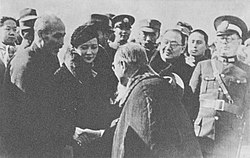Senrian-Shangean confederation
The Senrian-Shangean confederation was a proposed union between Shangea and Senria promoted mainly by Shangean liberal politicians in the aftermath of Shangea's defeat in the Great War. Taking precedence from Shangean cultural influence on Senria stretching back to the Kaihou period and Senrian influence on Shangea from the Toki dynasty unionists proposed creating a Senro-Shangean state that would be the first step towards creating a United Provinces of South Coius. The proposal was heavily supported by Premier Zhang Mingshu and his Constitutionalist Party but rejected across both the rest of the Shangean political spectrum and the entire Senrian political class. Following the dissolution of the Republic of Shangea following its defeat in the Shangean Civil War the idea faded from the political scene.
Context
Proposal
In March 1935 liberal Shangean politicians Zhang Mingshu and Wang Chaozhang both advocated for the creation of a unified Senrian-Shangean state in the aftermath of the Great War. Zhang believed that given the crimes Shangea had committed against Senria and the widespread hatred of the Treaty of Keisi and fears of the Nakagawa Plan in Shangea that the only way for the nations to avoid war in the future was to unite into a single political community that could lead to a period of peace and prosperity in south Coius.
Zhang outlined that a potential Senrian-Shangean Confederation would have a common president, currency, defence and foreign policy with other responsibilities being divided between devolved governments based in Keisi and Baiqiao. A federal capital would be based in Sakata, which would be both a monument to the crimes of the past and a symbol of the hope of the future. In common with other south Coian utopians at the time Zhang also called for both nations to use the Kokumon script over Shangean characters and envisioned that eventually a common language would unite the region.
Wang Chaozhang, an economist, supported Zhang in his proposal but stated that any union must also include economic integration. Wang believed that by economically uniting into a single unit Senria and Shangea would become so dependent on each other that the two nations would not be able to wage war, thus opening up the possibility of political integration to be expedited as quickly as possible.
Zhang and his supporters based their idea off a combination of democratic and capitalist peace and a utopianism regarding the ability of Senria and Shangea to both politically reconcile and culturally align. It is sometime debated whether Zhang and his supporters saw the cultural compatibility of Senria and Shangea as being part of a greater South Coian cultural sphere or whether they were simply Shangeocentric.
Negotiations
In December 1935 Zhang became Premier of Shangea. His assumption of power came at a difficult time - in September 1935 general Lu Keqian had launched the Corrective Revolution in Rongzhuo, rallying a coalition of nationalists and socialists to declare an alternative government beginning the Shangean Civil War. Lu and his supporters rejected the Treaty of Keisi and called for the creation of a "national-socialist republic" to destroy what they saw as a comprador government made up of xiaojin.
Due to the situation Zhang believed that only a union of Senria and Shangea could crush the rebellion, end the socialist threat, and bring peace to Coius. In March 1936 he met with Senrian premier Katurou Imahara to propose economic integration and a military union between the two countries, believing both steps being crucial for the creation of an eventual Senro-Shangean confederation. Imahara rejected the proposals, however, believing that Zhang was attempting to revive Shangean imperialism and insisting that the Shangean government instead abide by the Treaty of Keisi.
In May 1936 the Weranian Oberkommissar of the Coral Sea Eduard von Blumenthal wrote to the Weranian government recommending the Weranian government put "maximum pressure" on Senria to agree to some form of union with Shangea. Von Blumenthal state such a union would end the red menace in the region, prevent Estmere and Etruria creating a sphere of influence in Shangea and put to rest the possibility of another Senrian-Shangean dispute leading to a Great War. Weranian premier Otto Röttgen, who personally detested Imahara and had played a large role in ensuring a unified Shangea emerge from the Treaty of Keisi, concurred with von Blumenthal, but his exit from office in January 1937 meant Werania would ultimately support Senria in enforcing the Keisi treaty.
In November 1936, Zhang - hoping to garner support for the proposal from the Kyouwakai, who were in opposition to Imahara's Aikokutou - approached Kyouwakai leader Isao Isiyama with the possibility of union. Isiyama, who had proposed a three-way partition of Shangea during the Great War, responded by flatly telling Zhang that he "[did] not think the proposal would be viable any time in the foreseeable future".
Ultimately, with the memory of the Great War and Senrian Genocide still looming large, the notion of pan-Coianism being linked to the collaborationist government, and the suspected junior role Senria would play in any union meant there was vanishingly little support in Senria for the proposed union.
Aftermath
Zhang would fall from power in April 1937 and after a period of political chaos general Qin Xinyi would rise to power. Despite having being a senior commander in the Great War Qin had been willing to follow a pro-Grand Alliance policy having signed both the surrender and the Treaty of Keisi. Upon coming to power Qin declared he would form a Government of National Preservation akin to Imahara in 1927, destroy Lu Keqians forces and build a political regime akin to Imahara's in Shangea. Qin promised to uphold the Treaty of Keisi to the letter enabling him to receive political support from Senria. Due to this Qin was able to push Zhang and his supporters out of power and create a dictatorship around himself.

